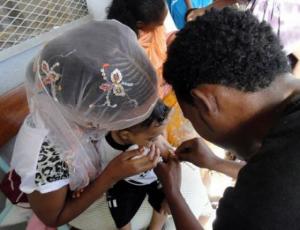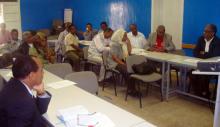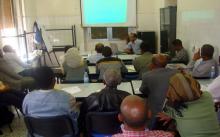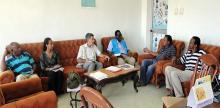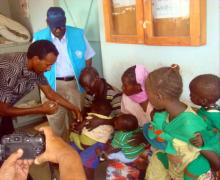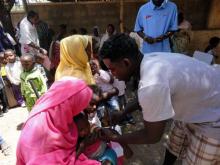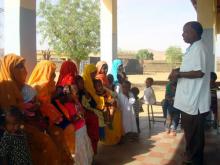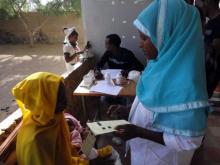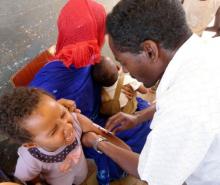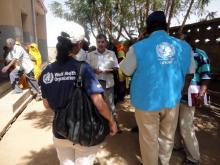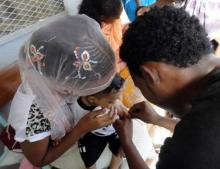Eritrea Conducted its 2nd African Vaccination Week
Over 500,000 children have been protected against eight killer but vaccine-preventable diseases -tuberculosis, diphtheria, whooping cough, tetanus, polio, measles and hepatitis B, and homophillus influenza B - throughout the country during the 2nd African Vaccination Week (AVW).
This was held integrated with other activities as a Child Health, Nutrition and Vaccination week from April 28 to May 02, 2012 in Eritrea.
The interventions of the campaign included:
- Measles Vaccination to children 9 - 47 Months (Nationwide)
- Vitamin “A” Supplementation to Children 6-59 months (Nationwide)
- Polio SNID to children 0 - 59 months Seven sub-zobas bordering Sudan.
- Screening and referring children (MUAC) 6-59 months for sever and moderate Malnutrition
The campaign focused on raising awareness on the values and benefits of immunization among all stake holders and the general population as well as on improving access to immunization service for high risk populations and for the people living in the hard to reach areas.
During the campaign, advocacy meetings linked with the launching of the campaign were organized in all the regions. Key public figures and eminent personalities were invited to renew their commitments through sensitization and creating conducive environment for the campaign.
To further magnify the campaign through awareness creation activities a continuous media based advocacy was conducted on the national radio and TV outlets, before the launching and during the campaign. Furthermore, an interview was conducted with the manager of the Expanded Program on Immunization (EPI) at the Ministry of Health and was aired on the national radio and TV programs.
To ensure the success of the campaign zonal and sub zonal EPI coordinators conducted pre-campaign assessments and micro-planning at the zonal and sub-zonal levels prior to the campaign. The findings were then used in the planning process of the campaign.
About USD 700,000 was mobilized from WHO, UNICEF and JICA to ensure successful implementation of the campaign. WHO Country Office’s support was focused on the immunization component of the campaign specially targeting less performing districts, the bordering regions: Gash Barka, Northern Red Sea, Southern Red Sea and Anseba.
In addition, UNICEF and WHO had also provided technical support for the optimal implementation of the campaign. Vaccines and injection supplies, vitamin A capsules were delivered two months prior to the campaign.
The planning process of the campaign started in January 2012, four months ahead of the campaign. The ICC established a task force and sub committees to coordinate the national campaign. Three sub-committees with members from the MOH, WHO, UNICEF were established and each of these sub-committees developed a plan of action for its area of focus and pursued its implementation.
A two day National Micro-plan and training orientation for 31 health workers was conducted on the first week of April 2012 in Asmara. During the training orientation Regional/Zonal campaign-coordinating committees were established, micro-plans for the regions developed, static and outreach areas identified and arrangements to meet transport requirements both at national and zonal levels were finalized.
Accordingly, Regional/Zonal and District/Sub zonal micro planning and training orientation for health workers and community volunteers were conducted a week before the launching of the national campaign.
To ensure high quality and effective training, a National Child Health, Nutrition and Vaccination Week field guide was distributed to all Regions/Zobas and Districts/Sub-zones in order to be used as a tool during training workshops. Monitoring tools (tally sheets, summary forms, supervisory checklists...) were also distributed during the training and orientation meetings.
Advocacy meetings were conducted at every level in most regions of the country. A launching ceremony was held in most zobas, each attended by about 50 representatives from Ministries of local Government, Health, Education, Labor and Human Welfare, Women and Youth associations, People’s Front for Democracy and Justice, religious organizations as well as community representatives.
During the ceremony speeches were delivered on the objectives, importance and the benefits of immunization by speakers from the Ministry of health, local administrators, religious leaders and others.
Village administrations played a significant role in the door-to-door mobilization efforts. Every village had a roster of children of eligible ages and that list was used to track missing children. Social mobilization activities were also conducted through school sensitizations in collaboration with the Ministry of Education.
The Local Government allocated vehicles to support the campaign and adequate fuel was provided at subsidized price to all vehicles assigned in the campaign.
Eritrea is one of the six Member States that are on track to achieving MDG 4 in the African Region. The country has made immunization, one of the most cost- effective public health interventions, among the national priority programs.



